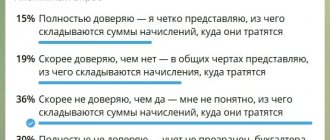The concept and characteristics of labor relations are set out in the Labor Code of the Russian Federation
The homeowners' association did not agree with this position of the GZHI body and filed a lawsuit to challenge the legality of the order. The plaintiffs argued that the requirements of the supervisory authority are unenforceable, since the work of the chairman of the HOA can only be formalized by an employment contract.
Residents of the building could learn about the amount of the chairman’s remuneration from the draft estimate of income and expenses of the HOA, which was previously posted in a publicly accessible place.
The court of first instance, considering the claim, noted that the choice of the chairman of the board of the HOA falls within the competence of the board of the partnership, if the Charter does not include such a choice among the issues that are decided at the PSC. A member of the board of an HOA cannot combine his activities on the board with other work in the partnership under an employment contract (Part 3.1 of Article 147 of the Housing Code of the Russian Federation).
The competence of the general meeting of HOA members also includes the issue of determining the amount of remuneration for board members, including the chairman. Since this is a “remuneration” and not a salary, this fact also indicates the absence of labor relations between the partnership and members of the board (clause 11, part 2, article 145 of the Housing Code of the Russian Federation).
In the work of the chairman of the HOA there are no characteristic features of labor relations: he has no job responsibilities and internal labor regulations, there is no employer (Articles 15, 56 of the Labor Code of the Russian Federation). How about.
The issue of assigning additional responsibilities to the chairman of the HOA - clerk, accountant, personnel officer, dispatcher and others - should be resolved at the OSCh. At the same time, the issue of increasing the chairman’s remuneration, rather than assigning him additional pay, and concluding a new employment contract are approved.
The court of first instance concluded that the order of the GZHN body complied with the requirements of the law and rejected the HOA’s claim.
5 dangerous language in the Homeowners Association Charter
68901
Recognition of the relationship as an employment relationship
By virtue of clause 11 of part 2 of Article 145 of the Housing Code of the Russian Federation, members and the chairman of the board of the HOA can carry out their activities on a reimbursable basis. They, as members of the elected collegial governing body of the HOA, may be paid remuneration in the amount determined by the general meeting.
At the same time, the payment of remuneration to the members and chairman of the board of the HOA depends on the availability of the necessary funds provided for these purposes in the annual budget of the HOA. In accordance with paragraph 3 of Article 148 of the Housing Code of the Russian Federation, the responsibilities of the board of a homeowners’ association include “drawing up estimates of income and expenses for the corresponding year of the partnership and reports on financial activities, submitting them to the general meeting of members of the partnership for approval.” If the decision to pay remuneration to the members and the chairman of the board was not made and was not reflected in the estimate, then the members of the board and the chairman have no legal basis for demanding payment of remuneration. Let us emphasize once again that payment of remuneration is not an obligation, it is the right of the owners.
Thus, in the case when the general meeting of the owners of the apartment building did not make a decision to pay remuneration to the chairman of the board, and no employment contract was concluded, the chairman of the board cannot demand payment of remuneration. The cassation ruling of the St. Petersburg City Court dated February 1, 2012 in case No. 33-1341/2012 resolved exactly this case: “The court of first instance established that the chairman of the board V.I. Volobuev The issue of remuneration for the chairman of the board was not raised at any meeting of the board and was not brought to the general meeting of the HOA. According to the HOA staffing schedule, the position of chairman of the HOA board is not included in the staff. The HOA board, including the chairman of the HOA board, is elected by the general meeting of the HOA members and performs its duties on a voluntary basis, this position is not included in the staffing table and funds are not provided for paying him wages, this practice has developed in the HOA since the day of its formation . The case materials establish that Volobuev V.I. carried out his activities as chairman of the board on a voluntary basis and did not apply to the HOA to conclude an employment agreement with him, in connection with which the court of first instance came to the reasonable conclusion that Volobuev V.I. had no grounds. collect remuneration from the HOA for the work performed.”
An important point is to prove the presence in the relationship of signs of civil law relations or signs of labor relations. Such proof takes place in court, so it is necessary to determine legal criteria by which civil law and labor relations can be distinguished.
There is no clear list of legally established criteria, however, you can be guided by the letter of the Social Insurance Fund of the Russian Federation dated May 20, 1997 No. 051/160-97, which states that the essential features of an employment contract are: 1. The presence in it of the employee’s labor function (and not a specifically defined task, which would be the final result of the work). 2. Availability of an order and an entry in the work book. 3. Procedure and form of remuneration. 4. Regular payment. 5. Also the mode and order of work, subordination to internal regulations.
The courts also take a similar position.
Thus, the Kuibyshevsky District Court of the city of Omsk made a decision on January 14, 2015 in case No. 2-20/2015 to refuse to satisfy the claim of the chairman of the HOA board (to recover compensation for unused vacation upon dismissal) due to the fact that in fact there were no labor relations between him and the Medic HOA: “there are also no signs of actual labor relations in the relations between the parties. The Medic HOA does not have a staffing table, a job description for the chairman of the HOA board, internal labor regulations, or regulations on remuneration. The chairman of the HOA did not obey the labor regulations of the partnership. The remuneration paid to the chairman of the HOA did not depend on his qualifications, the complexity of the work performed, the conditions for its implementation, the quantity and quality of labor expended. The plaintiff’s activities as chairman of the board of the HOA were not systematic; he performed his duties from time to time, upon requests to him, he did not obey the working hours, he did not have a workplace. The court also takes into account the fact that the development of the above documents fell within the competence of the chairman of the HOA board, but during the period of his activity he did not initiate the development and adoption of the staffing table, did not develop a single local act (job description, labor regulations, regulations on remuneration), did not insist on concluding an employment contract. Thus, during the period of his activity, the plaintiff himself did not consider his relationship as an employment relationship, and did not make attempts to properly formalize his relationship with the HOA.”
You should also pay attention to the Appeal ruling of the Perm Regional Court dated October 14, 2015 in case No. 33-11023/2015, according to which the conclusion of only an employment contract is not enough, it is necessary to have other documents relating to labor activity and relevant deductions: “Available in the case materials the employment contract dated December 7, 2007 was concluded by A.V. Ponomareva. acting both on behalf of the Homeowners Association "Granit-PK" and on its own behalf. From the above rules it follows that the relationship between the chairman of the board and the HOA is regulated by the provisions of housing legislation, i.e. are civil law. The execution of transactions by a representative on behalf of the person represented in relation to himself personally is prohibited by law (Article 182 of the Civil Code of the Russian Federation). ... There are also no local acts of the Granit-PK Homeowners Association regulating the performance of duties by the chairman of the partnership as labor, for example, internal labor regulations, job description of the chairman of the board, approved by the collegial governing bodies of the organization. There are no documents recording the working hours of the chairman of the HOA, or the vacation schedule for 2011–2014. Since the plaintiff positions himself as the head of the organization, compliance with these formal conditions depended on the proper performance of her duties and could, together with other circumstances (payment of insurance contributions to the Pension Fund of the Russian Federation), indicate a different nature of legal relations than what is provided for by virtue of housing standards legislation.
Thus, it is necessary to evaluate the relationship with the chairman of the HOA board separately in each specific case. If the position is present in the staffing table, order, the chairman is subject to internal regulations, performs certain duties, receives payment for their performance, decisions of the general meeting of owners also indicate that the chairman actually performs a labor function, then this indicates an employment relationship. If the activities of the chairman are not of a permanent nature, remuneration for this activity is not provided, or a management agreement is concluded with the manager (or management organization) - such relations are civil and labor relations do not arise.
The Supreme Court of the Russian Federation determined that the relationship of the chairman of the board with the HOA is not of a labor nature
The dispute moved to the Supreme Court of the Russian Federation, where the State Housing Supervision Authority filed a cassation appeal. The RF Supreme Court came to the conclusion that the appellate court based its conclusions on an incorrect interpretation of the legislation.
Filling the position of chairman of the owners' association depends on membership in the board and in the partnership, and, consequently, on the availability of ownership rights in an apartment building (Parts 1, 3, Article 143, Part 2, Article 147 of the Housing Code of the Russian Federation). This is the area of housing, not labor legislation.
The amount of remuneration to the head of the board is determined by the members of the HOA (clause 11, part 2, article 145 of the Housing Code of the Russian Federation). The owners who are on the board of the partnership cannot work there under an employment contract; this is prohibited by Part 3.1 of Art. 147 of the RF Housing Code, and the ban also applies to the chairman of the partnership.
The Supreme Court of the Russian Federation unequivocally noted that the relations of the chairman with the HOA are not of a labor nature and the body of the Civil Housing Association had the right to intervene in them, because:
- A homeowners' association is a form of self-organization of citizens for the management of common property.
- Members of the HOA board and its chairman, being the owners of premises in the house, act in the interests of all owners, including their own, and not in the interests of the employer.
- There is no person in the HOA who could qualify as an employer, therefore the relationship of the chairman with the HOA cannot be considered labor - they do not meet the requirements of Art. Art. 20, 56, 57 Labor Code of the Russian Federation.
The incorrect conclusion of the previous court about the labor relations of the partnership with the chairman of the board influenced the outcome of the proceedings, so the RF Supreme Court sent the court case for a new trial to the appellate instance, taking into account the stated position of the RF Supreme Court.
On the disqualification of the heads of homeowners' associations and management organizations under various articles of the Code of Administrative Offenses of the Russian Federation
169852
Is the chairman part-time?
Among a series of other problems, housing consumer cooperatives and homeowners' associations very often also face issues of formalizing labor relations with staff, including the chairman himself.
As is usually the case, we were prompted to discuss this topic by a question from one reader:
“I work as the chairman of the owners’ association (AP) part-time as at my main place. Can I also work as a chairman in another vehicle? As far as I know, this is not a part-time job according to the appendix to the Regulations on the conditions of part-time work No. 81/604-k-3/6-84, approved back in 1989.”
As modern bloggers say (or rather, write), I smiled: a competent chairman was caught. However, let's try to figure it out by carefully examining the problem.
Legacy of dark times?..
Indeed, there is such a document as the Regulations on the conditions of part-time work, approved by the Decree of the State Committee for Labor of the USSR, the Ministry of Justice of the USSR and the Secretariat of the All-Union Central Council of Trade Unions dated 03/09/1989 No. 81/604-K-3/6-84 (hereinafter referred to as ¾ Regulations).
And what is most surprising is that in electronic databases it is marked as valid (not cancelled), although, to be honest, in my legal practice until now I have never encountered it or come across references to it in any other official documents or articles , touching on issues of part-time work. And, as it turned out after talking with my “colleagues,” I’m not the only one.
Obviously, our reader had in mind clause 11 of the List of works that are not part-time jobs contained in the above-mentioned Regulations.
This paragraph refers to jobs that are not part-time work, other work performed in cases where the employee has a part-time working day for his main job and, in accordance with this, an incomplete salary (rate), if the payment for his work for the main and other work does not exceed the full salary (rates) at the main place of work.
In turn, according to Art.
343 of the Labor Code of the Republic of Belarus (hereinafter referred to as the Labor Code) in force today, work is the performance by an employee, in his free time from his main job, of another permanently paid job for the same or another employer under the terms of an employment contract. At the same time, Art. 345 of the Labor Code states that the duration of working hours established by the employer for part-time workers cannot exceed half of the normal working hours.
How much the norms of the Regulations adopted back in Soviet times compare with the norms of the current Labor Code is a controversial issue.
We would still argue that the definition of part-time work given in the Labor Code is somewhat at odds with the “Soviet approach” to this issue; its essence, which is not difficult to trace, boils down to the following: you work under a second employment contract for the same or another employer - that means you are already a part-time worker.
On a note
According to the cassation ruling of the RF Supreme Court No. 84-KA19-1, the chairman of the board of the HOA:
- Acts in its own interests and in the interests of other owners of premises in the house.
- Does not have an employer.
- Cannot receive wages for his work.
- He cannot work in the HOA under employment contracts, combining different positions according to the staffing table.
The chairman of the board, elected by its members, receives remuneration for his work. The amount of remuneration is approved at the general meeting of the HOA members, and then it is included in the draft estimate of income and expenses of the partnership.
If the chairman of the HOA also performs the functions of a clerk, accountant or other specialist for the partnership, then an increase in the remuneration of such an owner for work must be approved at the general meeting of HOA members.
Job description of the chairman of the HOA
The powers of the chairman are regulated by the relevant job description and instructions. It specifies the rights, responsibilities and powers. Often the instructions stipulate his release from office, the need to report to residents, etc.
The job description often specifies the possibility of temporarily assigning one's responsibilities to a third-party manager. The instructions also specify whether he can carry out part-time work.
The job description is issued in written form. It is signed by the HOA board and the chairman himself. The instructions must include a note indicating familiarization. Otherwise, the chairman of the HOA will be considered not to have taken office. All changes to the instructions can only be introduced by holding a general meeting and, accordingly, voting. Based on the results of the meeting, a protocol is issued, which will be the basis for making changes.
The chairman of the homeowners association: his rights and responsibilities
Being the chairman of an HOA means, above all, duties and great responsibility. Therefore, you will have to comply with the duties of the chairman of the HOA according to the housing code
Rights and responsibilities of the chairman of the HOA. What should the chairman of the HOA do? Functions and powers of the chairman of the homeowners association
According to the Housing Code, the chairman and members of the board of the partnership are obliged to:
- monitor compliance with all conditions of the homeowners association charter;
- control the collection of membership fees;
- draw up an estimate of income and expenses for the next year and approve it at a meeting of members of the partnership;
- manage an apartment building or enter into a management agreement with a management company;
- the responsibilities of the chairman of the HOA of an apartment building also include hiring workers to manage the building, as well as dismissing them if necessary;
- enter into agreements for the maintenance and repair of common property in an apartment building, for example, for the maintenance of elevator equipment, a gas boiler room, solid waste removal, etc.;
- maintain and update the register of HOA members, as well as maintaining documentation and accounting;
- hold general meetings of members of the housing association.
These are the responsibilities of the chairman of the HOA to the residents of the house. Also, the chairman and board of the partnership have the right to take out loans and manage common property, for example, rent out basements and technical floors. All these rights and obligations will be spelled out directly in the charter of the partnership and in the job description of the chairman of the HOA.
If the chairman of the HOA does not fulfill his duties
If the chairman of the partnership does not fulfill his duties according to the charter of the partnership or housing legislation, then you have the right to complain about him to the state housing inspectorate or to Rospotrebnadzor.
Responsibility of the chairman of the HOA
The responsibility of the chairman of the HOA according to the law is provided for in Articles 7.22 of the Code of Administrative Offenses “Violation of the rules for the maintenance and repair of residential buildings and (or) residential premises” and 7.23 “Violation of the standards for providing the population with utility services.” Again, responsibility rests with officials and legal entities. The chairman is not formally an official, but a legal entity, such as the HOA, can be held liable and the residents themselves will pay for the actions of the chairman.
Responsibility of the HOA chairman for misuse of funds
But for misuse of HOA funds, the chairman faces criminal liability under Article 160 of the Criminal Code of the Russian Federation, Part One, “Misappropriation or Embezzlement.”
Misappropriation or embezzlement, that is, theft of someone else's property entrusted to the guilty person, is punishable by a fine in the amount of up to one hundred and twenty thousand rubles, or in the amount of the wages or other income of the convicted person for a period of up to one year, or by compulsory labor for a term of up to two hundred and forty hours, or by correctional labor. labor for a term of up to six months, or restriction of freedom for a term of up to two years, or forced labor for a term of up to two years, or imprisonment for the same term.
Very often in the press there are cases where a thieving chairman is brought to trial for misuse of funds. For example, very often the chairmen of the partnership lease their own cars to the HOA. It seems like innocence, but it’s already a criminal offense. Therefore, if you are not a crystal honest person, then there is nothing for you to catch here. You won’t earn any money, but you can get away with hemorrhoids and other criminal liability in full.
Job description of the chairman of the HOA. Sample
All rights and responsibilities of the chairman of the board of the partnership are specified in the job description of the chairman of the HOA. Link to sample job description of the chairman
Does the chairman of the HOA have the right to post lists of debtors?
In fact, neither the chairman of the HOA, nor representatives of the management company have the right to post lists of debtors, since by doing so they violate the law on personal data. Disclosure of personal information about any person entails administrative punishment. Therefore, this kind of holding residents accountable for repaying debts should be treated with great caution, since the chairman of the HOA may be held liable.
Structure and content
The agreement consists of several points:
- Date of signing.
- Address and details of the employer (in this case it is a partnership).
- Full name, position and details of the person being hired (in this case, this is the head of the board of the partnership).
- Deadline for signing the document.
- Conditions and duties of the chairman.
- Responsibilities of the HOA.
- Salary (amount, regularity of payment).
- Operating mode.
- Information about vacation and social guarantees.
- Conditions under which a document can be terminated or adjusted.
- Signatures of the parties.






